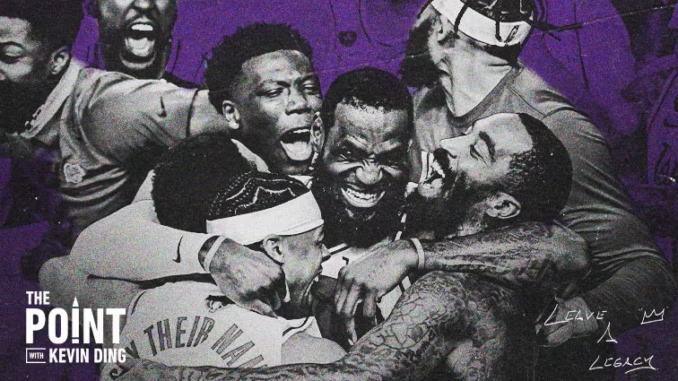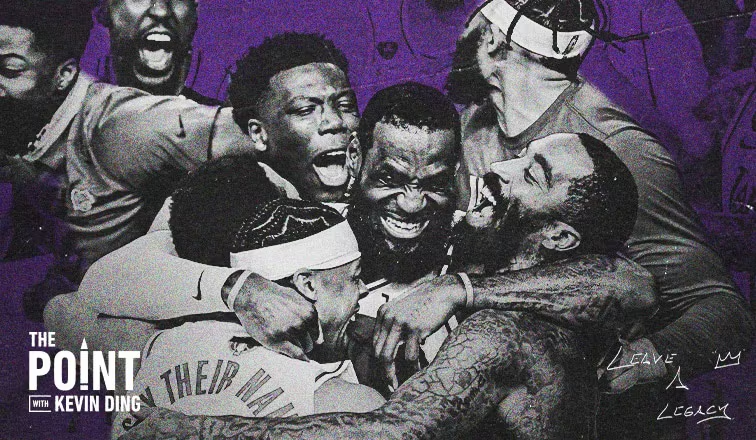
Certainly we don’t know in cases where the people have passed.
It didn’t stop Adam Silver from trying to make David Stern proud with
the bold, ultimately immaculate NBA bubble model. Or Jeanie Buss from
trying to make Jerry Buss proud with the championship that her father
dearly coveted for the Lakers to tie the Celtics at 17.
This Lakers team, featuring so many guys fortunate enough to be directly
inspired by Kobe Bryant, deeply understood the meaning of trying to make
him proud in this year of his death. In doing so, it meant inspiring
others everywhere—same as whenever Bryant or other greats won NBA
titles, urging us all toward our own excellence.
To understand why it meant so much for Anthony Davis to make Bryant
proud, you have to understand it goes beyond their personal
relationship.
Yes, Bryant welcomed Davis post-trade to the Lakers’ family. Yes, before
that Bryant counseled Davis how it was more important for a leader to be
respected than liked. Yes, before that Bryant was the elder statesman on
the 2012 U.S. Olympic team who appreciated the 19-year-old Davis’ wide
eyes signaled natural curiosity—Bryant’s favorite quality in people—as
opposed to fear.
However, it goes back to Davis as a boy on the South Side of Chicago,
when he was inspired by Bryant in ways Bryant couldn’t possibly know. It
was a grandfather and grandson, one passing on admiration and
inspiration to the other. On the porch was their own private Kobe fan
club, same as countless others all around the world.
Here’s how
Davis explained it
back in 2015, when he got a tattoo to honor Lamont Eberhardt, his mom’s
dad who died in 2010—the year of the Lakers’ last previous title: “I
looked up to him. Every day I would go to his house and we would just
talk basketball. He always pushed me. He always talked about Kobe, Kobe,
Kobe. He always wanted to make me go out there and—I don’t want to say
be better, but—do some of the same things [Kobe] did.”
A newly minted NBA champion, Davis now has. He pushed through every
ache, flat-out ignored real injuries and played every playoff game. He
hit a winning shot in the Western Conference Finals that sparked kids
everywhere to re-enact it and imagine being A.D. (even if A.D. still
yelled out “Kobe” after making it).
Then Davis played the kind of max-effort defense that has to make
talented players everywhere, including his fellow NBA stars,
re-evaluate how much energy can and should be poured into defense if you
want to win it all.
The Lakers’ playoff motto was “Leave a Legacy.”
The Lakers’ championship accomplishment was doing just that.

It was the first time in the NBA’s
74-year history that the championship was held at a single site. Still,
the 2020 playoff season might’ve had greater reach than any. To borrow
the words of the day, this one hit different. The statements that the
players regularly made about social injustice showed deep unity in the
midst of their fierce competition.
Years from now, when the photos or videos are viewed, people will
wonder, “Why wasn’t this championship played in a real NBA arena? Why
was “Black Lives Matter” written on the court? What did those particular
messages on the backs of the jerseys mean?”
Healthy discussion will ensue, and the Lakers are tied to that legacy.
Their players fulfilled their agenda on two epic fronts. And that’s not
even accounting for the unheard-of pandemic backdrop that left James
writing a verbal thank-you card on championship night to Apple pioneer
Steve Jobs.
“Big-time shoutout to the late, great Steve Jobs,” James said after the
Lakers’ nearly hundred days of isolation, “because without him, without
his vision, those FaceTime calls wouldn’t be possible.”
One legacy can and will shape another.
Even though James’ legacy is undeniably furthered by a fourth NBA
championship, he spent the final moments of the last game immersed in
how much of Davis’ legacy was being laid.
Because they share what Davis terms “true friendship,” James
good-naturedly ribbed Davis for his emotions in the moment.
“You’re soft! Oh, you crybaby!” James needled Davis.
But behind the veil of those words, James was actually seeing his own
soul when he first won an NBA title.
“Just the excitement. The ‘I can’t believe this.’ I definitely saw
myself: [age] 27 LeBron, 27 A.D.,” James said. “I definitely saw myself
in that. And what it did for me in my career? It basically let me know
that the work I put in on my craft, and the way I play the game, how I
was taught to play the game when I picked up a basketball when I was 8
years old, it’s OK to play that way and be able to win.
“No matter how many people tell you: ‘You should maybe shoot more, you
should maybe do this more, you should maybe be like him more,’ it let me
know that the way I play basketball and the way I was taught to play
basketball is the right way to play it, because you do see results.
“And then it just continues to boost your confidence. Not saying that
A.D. doesn’t already have confidence, but it takes it to another level.”
James’ make-the-right-play mindset by now is more accurately described
as basketball transformation than mere inspiration. The game has shifted
that materially through his style. How much of the Lakers’ overall
harmony should be attributed to James’ on-court generosity is impossible
to quantify, but he definitely led this horse to water.
And it definitely drank: James and Davis were the first pair of
teammates in NBA history to average 25-plus points while shooting at
least 50 percent from the field over an entire postseason (minimum six
games).
What James added foremost to his personal legacy was reinforcing his
status as an overachiever, even with all the initial outrageous
expectations and all the past accomplishments.
“No matter what I’ve done in my career to this point, there’s still
little rumblings of doubt or comparing me to the history of the game and
‘Has he done this? Has he done that?’ James said. “So having that in my
head, having that in my mind, saying to myself, ‘Why not still have
something to prove?’ I think it fuels me.”
Meanwhile, less seasoned players such as Alex Caruso, Kyle Kuzma and
Kentavious Caldwell-Pope went through lean years with the Lakers but
could preen in altogether different images as Lakers champions now.
Once-heralded veterans such as Rajon Rondo and Dwight Howard
unequivocally changed the twisted storylines that cast them as players
unable to maximize team-first roles.
“A couple years ago I said, ‘I am a champion,’ and people laughed,”
Howard said. “It wasn’t being a champion of a basketball game, but a
champion in life—knowing that there’s many times that we all fail and I
fail, but instead of folding and laying down, a champ gets back up. I’m
just happy to celebrate this moment with the Lakers and Laker nation and
my teammates. It’s been an amazing journey for all of us.”

As much chagrin as there was when they
didn’t win Game 5 in the Kobe-designed “Black Mamba” uniforms, the
Lakers instead won Game 6 and commemorated their white uniforms.
Any student of recent Lakers history should remember the only other
truly significant moment for the Lakers in white: Bryant’s 81-point
game.
But many might not recall that Jeanie Buss, while her father was still
in charge, was instrumental in the 2002 creation of those white
uniforms. Those seeking poetry with their legacy will appreciate the
symbolism at work in the Lakers winning in white: Jeanie’s breakthrough
as the NBA’s first female championship owner certainly qualifies as
inspiration on its own.
Truth be told, the Lakers were initially trying to honor another of
their legends with those white uniforms. It was the year after
broadcaster Chick Hearn’s death, and with the awareness that Hearn’s
100th birthday would’ve landed on a Sunday, the Lakers elected to wear
white for all Sunday home games.
The beauty of being with the Lakers is that you can learn from and build
upon all the greatness of those before you—if you are open to that.
If you are curious the way Kobe was and A.D. is.
If you get beyond your ego.
If you are truly secure that you can leave a legacy.
“The true mark of a legacy,” Bryant said in December 2017 when the
Lakers retired Nos. 8 and 24, “is how it affects the next generation.”
The fact that both James and Davis added tattoos in honor of Bryant just
days after his death in January is a testament to how much the current
Lakers stars cared about continuing Bryant’s legacy.
The best way, though, to make others proud or inspired is simply to stay
true to the legacy that is your own.
Davis already had a tattoo on his shoulder. It features his late
grandfather’s smiling face with the words, “Rest Up, Champ.”
“Champ” is what he called his grandfather.
“Champ” is also what his grandfather called him.
How sweet it is to be able t

Leave a Reply